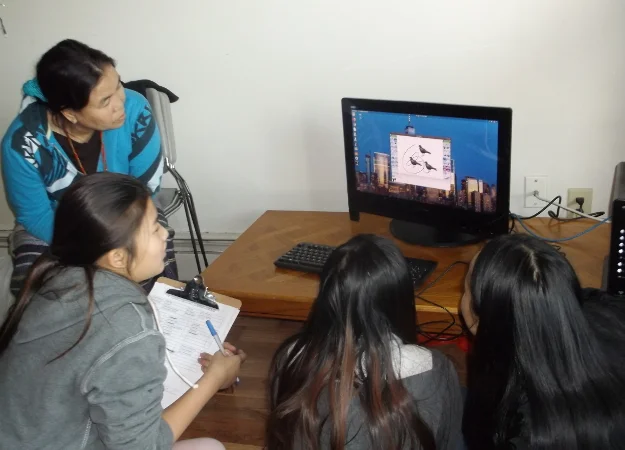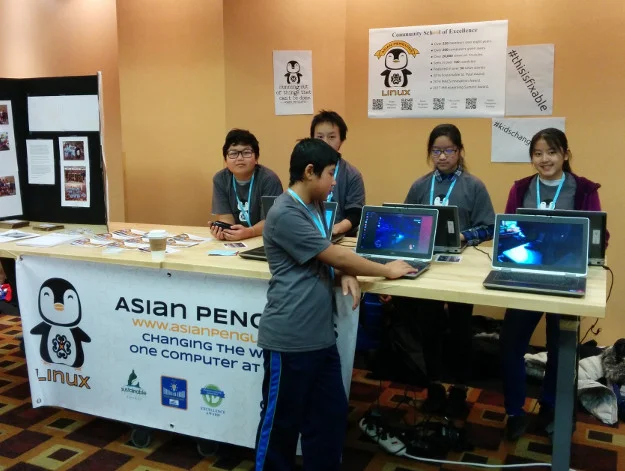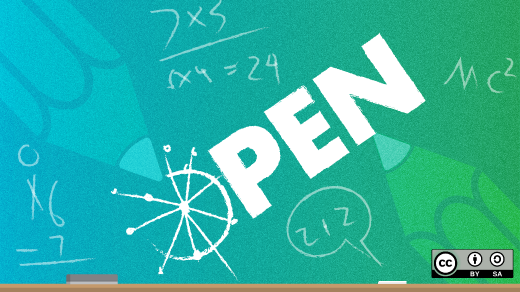"It always seems impossible until it's done." —Nelson Mandela.
On December 20, 2018, a team of four students and a chaperone from the Community School of Excellence (CSE) delivered a computer to the home of a needy student. CSE is a charter school in Saint Paul, Minnesota, that serves immigrants from Southeast Asia. Most students are Hmong (from Laos) and a minority are Karenni (from Myanmar). During the 2011-2012 school year, the school started the Asian Penguins club, the first Linux users group at a Hmong school anywhere in the world.

The team that delivered the computer on Dec. 20 was made up of three Karenni students and one student who spoke Karen, the same language as the family receiving the computer, and could translate the Penguins' instructions for using the computer. This event, called a Penguin Mission, has been repeated dozens of times since 2013, when the Asian Penguins first started giving away computers to close our school's digital divide. However, this mission was different for two reasons. It was the first time we had a student translating into Karen (a pretty small minority at our school). Second, and more importantly, the student receiving this computer was the last on our list of CSE students waiting for home computers. For the moment, CSE's digital divide is closed!
How the Asian Penguins came to be
At first, the Asian Penguins' focus was very small and simple: for kids to have fun while picking up a few skills in Linux and open source. We started by learning what open source software is, how it differs from proprietary software, and what it's like to use a Linux desktop distribution. From there, we moved into some basic hardware tasks, such as changing a video card or adding more RAM. Then we learned how to take a flash drive or disc and install the operating system. And we were having fun doing it!
During the next school year, we expanded by starting a case study where some students in the club replaced Windows on their school-issued laptops with Linux, which they used for their schoolwork. We were all learning a lot as we met weekly to discuss our experiences using Linux. And the kids got a thrill out of getting to use a Linux computer in class.
Then we made the big leap into refurbishing computers. At our school, over 80% of our students qualify for free or reduced-price lunch, and most of them are either refugees or children of refugees. Many of our families can't afford a computer in their homes.
Taking on the digital divide
In 2012, 30% of the students at CSE did not have a computer in their homes. Considering how much learning can take place electronically and how much of a modern family's life takes place on the internet, this number represented a challenge. We decided that this was a challenge the Asian Penguins could take on.
-
First, we taught club members how to install and configure Linux and the open source programs that would be useful to our students and families. To make this easier for the students, we created a standard checklist outlining what steps to do and in what order.
-
Second, we started getting computers, first through soliciting hardware donations and then through purchasing used computers. We sought out sources of computers that would allow us to buy them as cheaply as possible.
-
Third, we started doing fundraising to buy computers. Our most regular fundraising was selling snacks at school special events. We held a contest for each class to collect change from students for a week (we called it Pennies for Penguins). We did a crowdfunding campaign on Indiegogo. And we applied for and received grants from foundations.
-
Last, we asked school staff for referrals to students who needed computers. The basic criteria were that they had to be students at our school that did not already have a computer in their home. We then set about scheduling appointments to deliver the computers.
During the first year of our community donation project (which we now call Penguins Provide), we gave away seven computers, and we've increased the number of computers given away each year. One great side effect of giving computers away is that the publicity around our effort got us more hardware donations. Last year, we gave away 68 computers, and we have already given away 44 this year.
Since we began, we have given 241 computers away. Most have gone to our families, but we have also sent 14 computers to CSE's sister schools in Thailand and Laos, five to an anti-poverty nonprofit, and one to a Saint Paul community center.
A simple but successful formula
These days, most of the students at our school who needed computers have gotten them. We've managed to reduce the wait time for getting a computer down to two weeks or less. Of course, we are still a school, and the wait times are contingent on whether the Asian Penguins can come during study hall to work on computers or whether they have homework to finish!

But we've demonstrated that a school does not need to do anything big or expensive to close its digital divide. In reality, the formula is simple: get computers, have kids recycle computers, and give computers away. Our school did it. Any school can.
The digital divide is fixable. Would you like advice on how to do it? Contact me at studoeslinux@gmail.com or visit the Asian Penguins website.







1 Comment